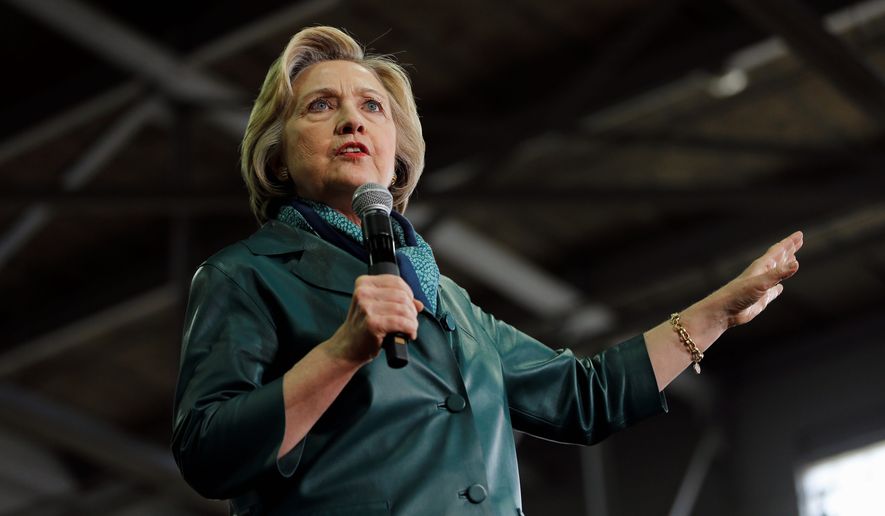Time has not been kind to Hillary Clinton, polls show, as the former first lady has watched her favorability ratings drop dramatically over the past year and her performance in hypothetical November matchups with leading Republicans deteriorate.
Political analysts say Mrs. Clinton has fallen victim to a tougher-than-expected primary fight against Sen. Bernard Sanders, a contest in which independents and hard-core progressives have abandoned her in droves in favor of the Vermont senator’s insurgent campaign.
At the same time, her favorable rating and voters’ faith in her as an honest candidate have suffered as the scandal around her use of a private email account while secretary of state has grown.
Now looking to move past Mr. Sanders and train her full attention on the general election fight, Mrs. Clinton must work to recapture voters she has lost this primary season and erase a trust deficit that could spell doom for the Democratic Party in November.
“Her numbers have slipped because she has been through a grueling primary process where young people don’t see her as fighting for their issues and independents being skeptical of her character. That combination has raised her negatives and weakened her matchup numbers against some Republicans,” said Darrell West, director of governance studies at The Brookings Institution. “The decline shows that she has not yet unified the party or eased some of the character concerns that surround her. Sanders has exposed key weaknesses in her. By continuing to raise money, he is able to keep attacking her even while it is clear she will be the Democratic nominee.”
Mrs. Clinton’s favorability ratings have taken the hardest hit. In April 2015 48 percent of Americans had a favorable opinion of her, compared to 42 percent who said they had an unfavorable view, according to Gallup surveys.
In the most recent Gallup Poll — conducted between March 28 and April 10 — only 40 percent of Americans said they have a favorable view of the former first lady, while 54 percent said they have an unfavorable opinion of her.
That steep decline goes hand in hand with sinking poll numbers against leading Republican candidates. While the figures vary from poll to poll, most surveys show she now does worse against GOP contenders than she did one year ago.
A Quinnipiac poll taken in May 2015, for example, saw her beating Republican front-runner Donald Trump by 18 points. A Quinnipiac survey released last month gave her just a six-point edge.
A Fox News poll conducted in July of last year gave her a 17-point win over Mr. Trump. A Fox survey released earlier this month showed her winning by just seven points.
Her general election performance against Texas Sen. Ted Cruz also has declined, though not as dramatically.
A hypothetical contest against Ohio Gov. John Kasich, by all accounts the most moderate Republican still left in the party primary, is where Mrs. Clinton has fallen hardest, perhaps a sign that independents and moderates are fleeing her side.
A Fox News poll released in July 2015 said she would beat Mr. Kasich by 19 points. A Fox survey released two weeks ago said she’d lose to the Ohio governor by nine points.
The troubling figures come as she remains unable to fully dispatch Mr. Sanders and end a Democratic primary race once thought to be little more than a coronation ceremony for Mrs. Clinton.
While she’s far ahead in the delegate race and likely will secure big wins in Pennsylvania, Maryland and possibly elsewhere in a slate of primaries Tuesday, Mr. Sanders has vowed to remain in the race all the way until the party convention in July.
As he wages a passionate campaign, Mr. Sanders continues to hammer away on Mrs. Clinton and is likely contributing to her sinking favorability ratings.
Campaigning in Pennsylvania last week, he once again zeroed in on Mrs. Clinton’s pricey speeches to firms such as Goldman Sachs in the years after she left the State Department. Those speeches, among other factors, have helped paint Mrs. Clinton as a candidate of the establishment and, perhaps, as someone who can be easily swayed by money and powerful special interests.
“I kind of think if you’re going to get $225,000 for a speech, it must be a brilliant, insightful, world-shattering speech, don’t you think? It must be a speech that would probably solve all of the crises facing our planet and then some. And it was probably written in Shakespearean prose,” Mr. Sanders said, mocking Mrs. Clinton and again calling on her to release the transcripts of the speeches, something the former secretary has refused to do.
“And I think a speech of that extraordinary magnitude should be shared with the American people,” the senator added.
Meanwhile, exit polls in virtually all states that have voted thus far have shown that many Democratic voters simply don’t see Mrs. Clinton as honest and trustworthy. That poor perception can be traced back to the ongoing controversy around her use of personal email — and the fact that emails received and sent from her private account contained classified information, contradicting her past assertions — and foreign donations to the Clinton Foundation that critics say were meant to influence her decisions at the State Department and other scandals.
Fully addressing those problems, specialists say, can’t be done until Mrs. Clinton finally pushes Mr. Sanders out of the race.
“The general [election] will get ugly, especially if Trump is the Republican nominee. The Democratic Party needs to put plans in place now for how to play defense and put a positive message to the voters,” said Brandon Rottinghaus, a political science professor at the University of Houston who specializes in presidential leadership. “The longer the Democrats debate the nominee, the more difficult it is to strategize for November.”
• Ben Wolfgang can be reached at bwolfgang@washingtontimes.com.




Please read our comment policy before commenting.